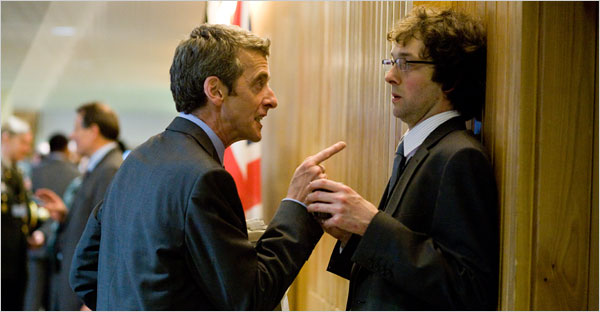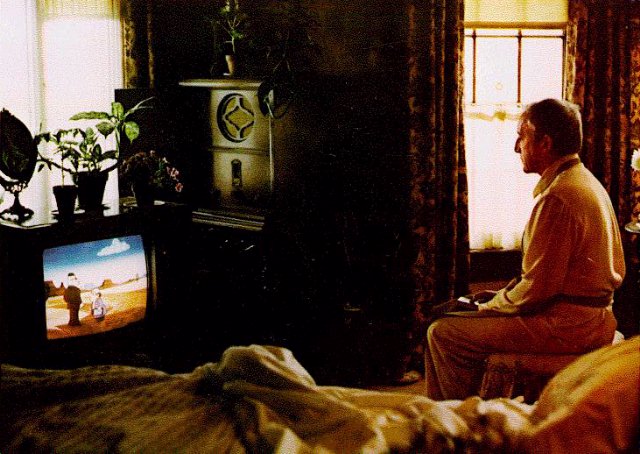Distant Relatives: Dr. Strangelove and In the Loop
 Thursday, March 31, 2011 at 6:19PM
Thursday, March 31, 2011 at 6:19PM Robert here, with my series Distant Relatives, where we look at two films, (one classic, one modern) related through theme and ask what their similarities/differences can tell us about the evolution of cinema.

Great and powerful leaders
The world is run by idiots. Here’s an observation that is not at all new in the history of comedy or for that matter, humanity. Political satire is more often than not based on the assumption that the people at the top are at best incompetent to enact the right priorities, at worst adamant in their pursuit of the wrong ones. There’s a line of thinking that suggests anyone with the desire to become a politician is, by that virtue alone, unfit to be one. Never is this assertion more comically rife than in times of war, when we’re all scared and confused and asking our leaders to help us through the fog of conflict.
Dr. Strangelove: or How I Learned to Stop Worrying and (cue the teasing female voice) Love the Bomb and In the Loop are two films during two times of war, one Cold the other Middle-Eastern, that aren’t exactly overt anti-war political statements. That is to say the films could, I suppose, get behind a war if the people promoting and running it were ever even slightly better than horrible human beings. But in their realities that could never be the case.
Fingers on the big red button

In case you’ve never seen it, Dr. Strangelove starts off with mad General Jack D. Ripper (Sterling Hayden) giving an unauthorized go code to go nuclear (literally) on the Soviet Union.
This puts wet noodle President Merkin Muffley (Peter Sellers) and his advisers, including first-rate chest pounding pa-toot General Buck Turgidson (George C. Scott), in the unenviable position of preventing World War III. The film ends with wheelchair-bound, involuntary Nazi saluting, mad scientist Dr. Strangelove (Peter Sellers again) rising to his feet to tell his furher president that surviving nuclear catastrophe would “not be difficult.”
In In the Loop, British Minister for International Development Simon Foster (Tom Hollander) sets in motion a series of befuddling PR non-events by calling an inevitable war “unforeseeable” in public thus provoking the wrath of foul-mouthed, shit storm spewing, Director of Communications Malcolm Tucker (Peter Capaldi) and sending them both off to the US where an Assistant Secretary of State and an Assistant Secretary of State are jockeying for professional position and personal promotion in the politics of war and peace that are about to erupt.
Screech screech, coo coo
Got it? If you’re confused, don’t worry. Most of the characters in these two films spend most of their time feeling that way, too. These are comedies of communication. In the Loop’s phone-centric poster and punny tagline “The fate of the world is on the line” and Dr. Strangelove’s similar poster and tagline “The hot-line suspense comedy” can confirm that. The films seem to suggest that the worst outcome of incompetent leadership is that no one can communicate properly. President Muffley can’t communicate when he attempts to call a drunken Soviet Premier. Simon Foster can’t communicate when he attempts to clarify his murky position on the war over and over.

Then again, Malcolm Tucker and General Ripper sure can communicate, if not their meaning, then their anger, their wide eyed crazy. They are the closest thing these films have to villains; they’re the war hawks and they’re the most effective at their jobs. They don’t need communication, they have actions. Meanwhile the doves above have nothing to do but bumble their way through being mankind’s last best hope for peace. In both films there are essentially only these two kinds of people: hawks and doves and they epitomize the two types of leaders mentioned at the front. The hawks have the wrong priorities and the doves are completely helpless to enact the right ones. Part of the awkward fun of these films is watching each character figure out where they want to fall, among the earnest or the effective (particularly in the case of Scott’s Turdgison who must help the doves despite the fact that every ounce of his being has been groomed for war.)
Propaganda, I mean, public relations
The major difference between the two films, the characters of In the Loop aren’t necessarily as focused on the prevention or acceleration of war as the public perception of where they stand on the issue. The President and Prime Minister aren’t characters with any screen time so, the characters we do get are in situations somewhat bound by the actions of people who rank above them. In opposition, the characters of Dr. Strangelove include the president and his closest advisers. Yet since they’re dealing with a war started by a rogue general their situation is bound by the actions of the people who work below them. Still it speaks volume that in the time between Dr. Strangelove and In the Loop the focus of such a film has shifted from the war room to the spin room. The men who sell the message are now the focus, though they’re no less inane, insane, and incompetent.

And what of times of peace? Are our leaders still viewed as nincompoops then? Not quite half-way between Dr. Strangelove and In the Loop came Being There’s hero Chauncy Gardner (Peter Sellers one more time), Washington power player, advisor extraordinaire to an impotent (yes, literally) president, and mentally challenged gardening enthusiast. It's also halfway between our two films because it involves both the President and his spinners who decide, by chance, that a man with the mind of a child is their best candidate for leader of the free world. Chauncy can’t communicate that well either, but everyone who listens to him hears brilliance. So whether peace or war, whether now or then, thank goodness that these films are comedies. Because the overall conclusion is, what can you do but laugh? The world is run by idiots.



Reader Comments (6)
Both films were my favorite film of the pertaining year. I love this piece very much. 'In The Loop' deserves all the credit in the world for being the GREATEST political satire since Strangelove. At least in this piece it gets to share its company.
I'm confused about how you view Malcolm. At the end of the day, he's not the villain. He's just a minion. The villain is Linton Barwick.
Great article! It's so long since I've seen Dr. Strangelove- I might have to do a double bill of these at some stage.
I agree with Volvagia- I didn't see Malcolm Tucker as the villian of In The Loop; for me it was definitely Linton Barwick. Unlike General Ripper, Tucker is just a cog in the machine. He spends his time dealing with other people's mess-ups and, in the end, all of his machinations are just playing into Barwick's agenda- as he finds out in that excruciating scene in the UN meditation room. I don't know that Tucker is a hawk or a dove, his idealogy changes with that of his masters', and part of the fun of In The Loop is having this almost apolitical whirlwind of swearing at the centre.
That is a good point you guys have and I'm willing to concede it. Villain was probably too harsh a term.
Great piece as always. I especially love your point about how the focus has changed from the war room to the spin room. These are two of my all time favourite political comedies
Cool post, indeed the idea is interesting and very well accepted.
--------------------------------------------------
Generic Viagra